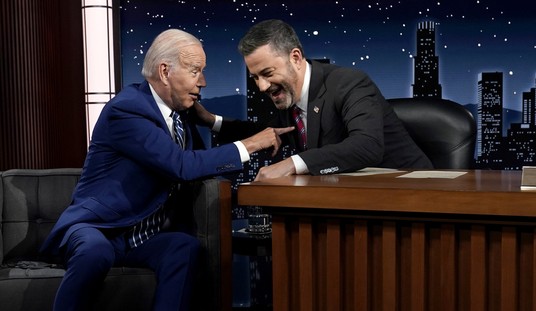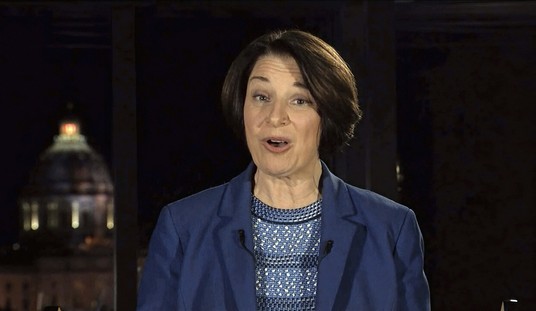You win this round. But we’ll be back.
“The Pledge is constitutional,” Judge Carlos Bea wrote for the majority in the 2-1 ruling. “The Pledge of Allegiance serves to unite our vast nation through the proud recitation of some of the ideals upon which our Republic was founded.”
The same court ruled in Newdow’s favor in 2002 after he sued his daughter’s school district for having students recite the pledge at school.
That lawsuit reached the U.S. Supreme Court in 2004, but the high court ruled that Newdow lacked the legal standing to file the suit because he didn’t have custody of his daughter, on whose behalf he brought the case…
Reached on his cell phone, Newdow said he hadn’t been aware that the appeals court had ruled against him Thursday.
“Oh man, what a bummer,” he said.
Here’s the PDF of the opinion in case you’re up for a little light reading. Total pages: 193, including a 130-page dissent by ultraliberal Stephen Reinhardt. The gist of the majority opinion:
Where, as here, compulsion to recite is absent, government action respects an establishment of religion only if the government coerces students to engage in a religious exercise. Coercion to engage in a patriotic activity, like the Pledge of Allegiance, does not run afoul of the Establishment Clause. The Supreme Court recognized this distinction in the earliest of the school prayer cases, Engel v. Vitale, 370 U.S. 421 (1962). In Engel, the Court considered a school’s policy directing children to say aloud a prayer written by state officials. The Court found this policy violated the Establishment Clause because “[the] program of daily classroom invocation of God’s blessings as prescribed in the Regents’ prayer is a religious activity. It is a solemn avowal of divine faith and supplication for the blessings of the Almighty. The nature of such a prayer has always been religious.” Id. at 424-25. The Court was also careful, however, to distinguish the prayer in Engel from a ceremonial reference to God in a footnote…
In other words, the Establishment Clause is violated only if (a) you’re forced to praise God or (b) forced to listen to someone else praise God in the context of a prayer. No prayer + no compulsion = no problemo! Drop a bomb on ’em, Reinhardt:
The undeniably religious purpose of the “under God” amendment to the Pledge and the inherently coercive nature of its teacher-led daily recitation in public schools ought to be sufficient under any Establishment Clause analysis to vindicate Jan Roe and her child’s constitutional claim, and to require that the Pledge of Allegiance, when recited as part of a daily state-directed, teacher-led program, be performed in its original, pre-amendment secular incarnation that served us so well for generations. Surely, our original Pledge, without the McCarthy-era effort to indoctrinate our nation’s children with a state-held religious belief, was no less patriotic. For purposes of this case, the only difference between the original secular Pledge and the amended religious version is that the former did not subject, and was not designed to subject, our children to an attempt by their government to impose on them a religious belief regarding the existence of God. We should indeed have had more faith in our country, our citizens, and our Constitution than we exhibited at the peak of the McCarthy era when we enacted the religious amendment to our Pledge of Allegiance, in part to inculcate in our children a belief in God. In doing so, we abandoned our historic principle that secular matters were for the state and matters of faith were for the church. The majority does so again today, sadly, by twisting, distorting, and misrepresenting the law, as well as the issues that are before us.
Today’s majority opinion will undoubtedly be celebrated, at least publicly, by almost all political figures, and by many citizens as well, without regard for the constitutional principles it violates and without regard for the judicial precedents it defies and distorts, just as this court’s decision in Newdow I1 was condemned by so many who did not even bother to read it and simply rushed to join the political bandwagon. As before, there will be little attention paid to the constitutional rights of the minority or to the fundamental tenets of the Establishment Clause. Instead, to the joy or relief, as the case may be, of the two members of the majority, this court’s willingness to abandon its constitutional responsibilities will be praised as patriotic and may even burnish the court’s reputation among those who believe that it adheres too strictly to the dictates of the Constitution or that it values excessively the mandate of the Bill of Rights.
Don’t be too hard on ol’ Steve: He sided with the majority today in a related case finding that “In God We Trust” is A-OK on the currency. As for the pledge, I don’t see the point of the coercion requirement. If Congress passed some strictly hortatory “sense of the House/Senate resolution” that God exists and should be worshiped, I’d like to think that a court would knock that down as a violation of the Establishment Clause. “Congress shall make no law” means Congress shall make no law, coercive or not. But your mileage may — and, I’m sure, will — vary.
Elsewhere in atheism news, apparently it’s cool for us to be Buddhists now. Nuance.








Join the conversation as a VIP Member